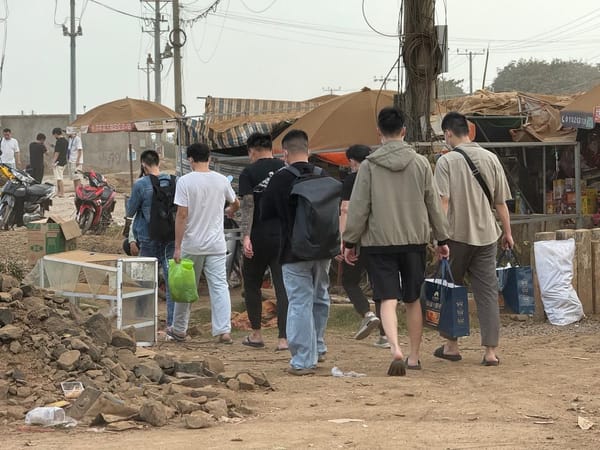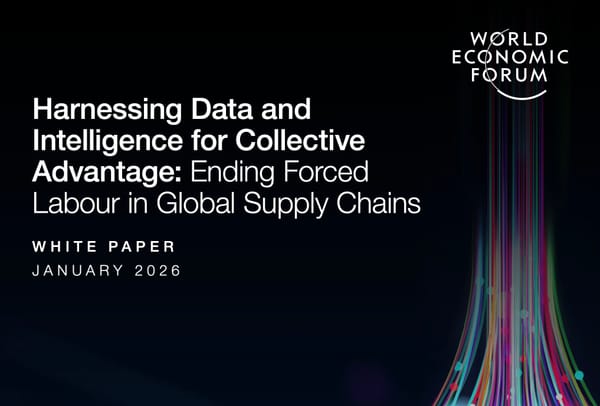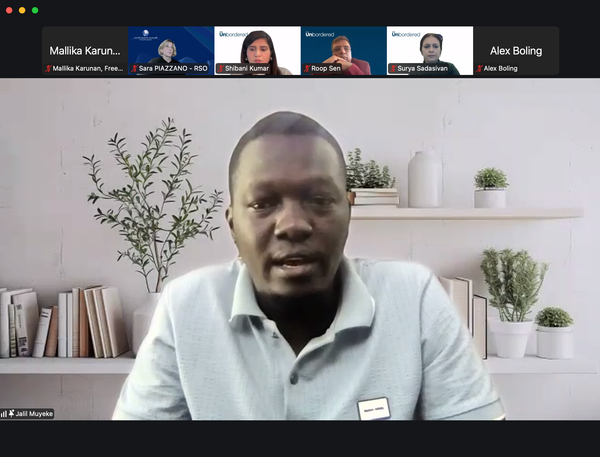CSOs urge the financial sector to do more to disrupt the online scamming ecosystem
Civil society groups highlight gaps in the response to trafficking for online fraud in a submission to the UN, a research paper examines corporate lobbying impacts, and campaigners call for action on fast fashion’s exploitative business model.

Freedom Collaborative, Humanity Research Consultancy (HRC), LexCollective and Operation Shamrock have created a joint report on the role of the financial sector in eradicating modern slavery in Southeast Asia’s cyber-scam compounds. The report was produced in response to a call for inputs by the United Nations Special Rapporteur on contemporary forms of slavery, Tomoya Obokata, and calls for recognition of this complex form of modern slavery, with recommendations for its prevention.
The submission comes amid the publication of a new report from UNODC, warning of a “critical inflection point” in the fight to contain the cyber-fraud industry, as its potentially irreversible expansion beyond Southeast Asia allows criminal groups to pick, choose, and move jurisdictions, operations, and value as needed, with the resulting situation rapidly outpacing the capacity of governments to contain it. As criminal groups hedge beyond the region, crime groups from other parts of the world are able to utilize the extensive infrastructure that has grown up around scamming operations to launder proceeds of crime and circumvent formal financial systems, it says.
UNODC notes that criminal groups’ continued success is fueled by their capacity to launder money through cryptocurrencies and underground banking. Our report explores this broader context in which cyber-scam operations exist and thrive, and details the range of financial actors involved, such as scam compound owners, tycoons, elaborate networks of money launderers, and finance and communications service providers. In some cases, local authorities are also actively involved in human trafficking, money laundering, and other aspects of these criminal enterprises.
While international, regional, and domestic legal frameworks exist to address human trafficking, modern slavery, and money laundering, our report details the way in which the complexity of transnational criminal networks and the layers of criminality inside cyber-scam compounds highlight gaps in these laws. This includes the inconsistent regulation and monitoring of non-traditional financial actors, impunity gaps in laws targeting human trafficking and modern slavery in the context of forced criminality, and the under-enforcement of other relevant laws due to local corruption, financial system vulnerabilities, challenges in cross-border investigations, and a lack of political will.
Civil society organizations, meanwhile, are responsible for much of the information gathering in this area but are hampered by an acute lack of funding and resources. For instance, HRC and LexCollective have developed typologies to explain the illicit financial flows linked to forced criminality and money laundering in cyber-scam compounds, map the networks of actors involved, and identify red flag indicators; Operation Shamrock has developed a model for collaboration between the public and private sectors, including financial institutions, cryptocurrency experts, law enforcement, prosecutors, scam victims, and civil society; and Freedom Collaborative’s Forced Criminality Response Working Group builds trust across diverse groups of stakeholders and supports rapid intervention efforts. We have also conceptualized a pilot project, the Survivor Whistleblowing Platform, to enable trafficking survivors to report vital evidence securely.
In particular, the report recommends that: governments should mandate, and the financial sector should implement, strong monitoring and reporting standards on non-traditional financial actors, and the financial sector should support the development and dissemination of up-to-date typologies on trafficking in persons; the international community should allocate sufficient resources and protection from retaliation to civil society, to improve cross-border cooperation and intelligence sharing; and key stakeholders should impose multi-modal costs on criminal hosts and kingpin entities, disrupting their criminal economy through sustained action to assist trafficking victims and address the root causes of human trafficking and modern slavery.
Finally, while there have been recent crackdowns on cyber-scam compounds in Southeast Asia, these often represent “pressure relief mechanisms”, rather than sustained action to assist trafficking victims in repatriation or to stop criminal groups and government officials from profiting. Therefore, the international community should call for multilateral coordination to disrupt the cyber-scam economy, ensure sufficient resources are allocated to civil society supporting the victim identification and repatriation process, and call on governments to stop attacks on whistleblowers, activists, and journalists exposing abuses in cyber-scam compounds.
Here’s a round-up of other noteworthy news and initiatives:
A coalition of NGOs has lodged a formal complaint with the European Ombudsman condemning the undemocratic, untransparent and hurried way in which the European Commission developed its “Omnibus” proposal to water down recently adopted EU sustainability laws, saying the process enabled a small group of industry interests to take control. The proposal is at odds with the EU’s core democratic values and environmental goals, and could undermine its economic stability, they say.
A new research paper from Global Reporting Initiative (GRI) highlights growing scrutiny on whether corporate lobbying efforts align with public interests and sustainability commitments, and flags up risks such as regulatory stagnation, delays in addressing global challenges, and shifts in policy decisions away from the public interest. It recommends that organizations go beyond legal compliance and voluntarily disclose lobbying activities, centralizing disclosures in a single location.
As Shein reportedly secures approval from the UK’s Financial Conduct Authority (FCA) for its planned initial public offering in London, Anti-Slavery International argues that critiques of the retailer miss the broader fast-fashion problem and let many other businesses off the hook, saying that stronger laws and improved business standards are needed to address the entire fast-fashion business model of exploitative and extractive practices.
The nonprofit Vera Institute of Justice says staff from Elon Musk’s Department of Government Efficiency contacted them to assign a team to the organization, saying they planned to similarly install teams with all nonprofits receiving funds appropriated by Congress. “Regulatory oversight is one thing, but this would seem to go into much further, darker territory, where the government threatens the functioning of nonprofits that it does not agree with,” one expert notes.
And this newsletter examines the threat to the tax-exempt status of nonprofit organizations viewed by President Trump as progressive roadblocks to his agenda, in particular those involved in climate change efforts, social justice and immigration, while funding for organizations overseas could also be targeted.
Thailand’s auditing industry fails to protect migrant factory workers, glossing over harsh conditions, accepting false information about factory policies and the treatment of workers, and enabling businesses to cover up illegal practices and exploitation, according to this report.
The UN SDG Action Campaign invites applications for its “The Heroes of Tomorrow” awards, which celebrate initiatives and individuals that mobilize, inspire and connect people committed to building a better world. The deadline for applications is 7 May.




